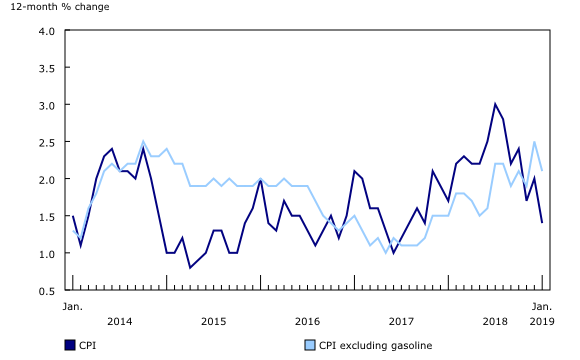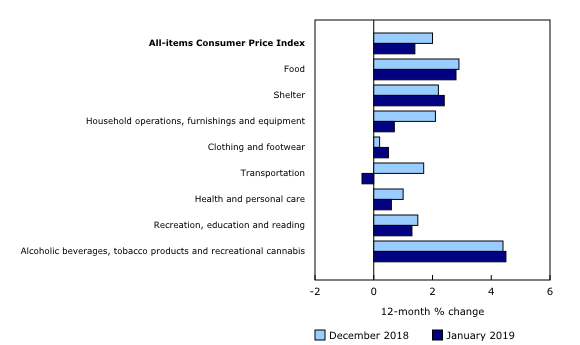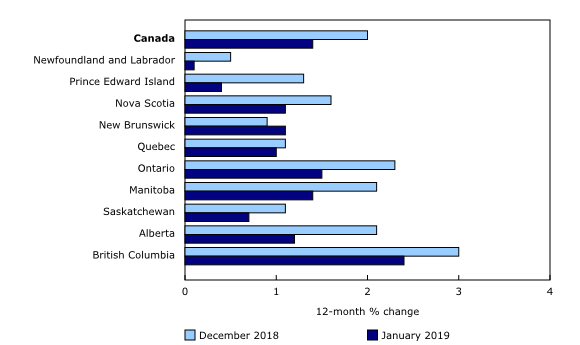Consumer Price Index, January 2019
Archived Content
Information identified as archived is provided for reference, research or recordkeeping purposes. It is not subject to the Government of Canada Web Standards and has not been altered or updated since it was archived. Please "contact us" to request a format other than those available.
Released: 2019-02-27
January 2019
1.4% 
(12-month change)
The Consumer Price Index (CPI) rose 1.4% on a year-over-year basis in January, down from a 2.0% increase in December. Energy costs declined 6.9%, while the growth in the price of services slowed to 2.7% as transitory pressures from the air transportation, telephone services and travel tours indexes, which boosted the all-items CPI in December 2018, dissipated. Excluding gasoline, the CPI was up 2.1% on a year-over-year basis.
Component highlights
Prices increased year over year in seven of the eight major components in January, with the transportation component (-0.4%) posting the sole year-over-year decrease, the first 12-month decline in the index since July 2016.
Gasoline prices led the decline in consumer energy costs amid an oversupply in the United States, falling 14.2% year over year in January. Similarly, prices for fuel oil and other fuels (-3.3%) declined following an increase the previous month. Natural gas prices (-2.3%) continued to trend downward.
Consumers paid 2.7% more for services compared with January 2018, following a 3.5% increase in December, as transitory pressures in several indexes eased. Month-over-month decreases in the air transportation (-16.0%) and travel tours (-4.7%) indexes were attributable to price declines following the end of the holiday travel season. Prices for telephone services declined year over year in January after increasing 6.1% in the previous month. The decrease was, in part, the result of price increases in January 2018, which fell out of the 12-month movement, after industry-wide price promotions in December 2017. Meanwhile, the rent index increased 0.9% month over month in January.
Regional highlights
Consumer prices rose less on a year-over-year basis in nine provinces in January compared with December.
Prices grew 1.5% year over year in Ontario, following a 2.3% increase the previous month. Year-over-year prices for food purchased from restaurants (+4.5%) and child care and housekeeping services (+2.3%) rose at a slower pace compared with December. Price increases in these indexes in January 2018, which coincided with a legislated minimum wage increase, no longer impacted the 12-month movement in January 2019.
In Prince Edward Island, the all-items CPI rose 0.4% year over year, after a 1.3% increase in December. The other passenger vehicle operating expenses index (-0.3%) and the local and commuter transportation index (-1.7%) declined. The declines coincided with a provincial initiative to redistribute carbon levy proceeds to residents of the province by lowering the prices of drivers' licences, vehicle registration fees and transit passes.
Seasonally adjusted monthly Consumer Price Index
On a seasonally adjusted monthly basis, the CPI declined 0.1% in January, following a 0.2% increase in December. The shelter index (+0.5%) and the alcoholic beverages, tobacco and recreational cannabis index (+0.5%) reported the largest increases, while the transportation index (-0.7%) declined the most.
Note to readers
Methodological change: New approach for estimating the Rent Index
The Consumer Price Index (CPI) measures the change in prices of consumer goods and services over time. To accurately reflect trends in the market and in consumer behaviour, Statistics Canada periodically reviews and updates the methods applied to various components of the CPI.
The release of the January 2019 CPI (published on February 27, 2019) marks the implementation of methodological changes for the calculation of the rent index.
Detailed documentation describing the new rent index approach is available in the article "New approach for estimating the rent component of the Consumer Price Index," which is published as part of the publication Prices Analytical Series (62F0014M).
Basket update
The basket of goods and services used in the calculation of the Consumer Price Index (CPI) has been updated with the release of the January 2019 data. The basket weights were updated based primarily on consumer spending patterns from the 2017 Survey of Household Spending (SHS), replacing those from the 2015 SHS.
The base period, in which the CPI is set to equal 100, remains 2002.
The 2017 basket classification system was updated to add new, relevant goods and services, while removing some that are obsolete. Some minor changes were made to published index titles to clarify the definition of some series.
The alcoholic beverages and tobacco products major component has been updated to include recreational cannabis. Additionally, medicinal cannabis has been added under medicinal and pharmaceutical products.
Some special aggregates as well as the area rugs and mats index will no longer be published.
For more detailed information, consult the document entitled "An Analysis of the 2019 Consumer Price Index Basket Update, Based on 2017 Expenditures" in the publication Prices Analytical Series (62F0014M).
Real-time data tables
Real-time data table 18-10-0259-01 will be updated on March 11.
Next release
The Consumer Price Index for February will be released on March 22.
Products
More information about the concepts and use of the Consumer Price Index (CPI) is available in The Canadian Consumer Price Index Reference Paper (62-553-X).
For information on the history of the CPI in Canada, consult the publication Exploring the First Century of Canada's Consumer Price Index (62-604-X).
Two videos, "An Overview of Canada's Consumer Price Index (CPI)" and "The Consumer Price Index and Your Experience of Price Change," are available on Statistics Canada's YouTube channel.
Contact information
For more information, or to enquire about the concepts, methods or data quality of this release, contact us (toll-free 1-800-263-1136; 514-283-8300; STATCAN.infostats-infostats.STATCAN@canada.ca) or Media Relations (613-951-4636; STATCAN.mediahotline-ligneinfomedias.STATCAN@canada.ca).
- Date modified:




